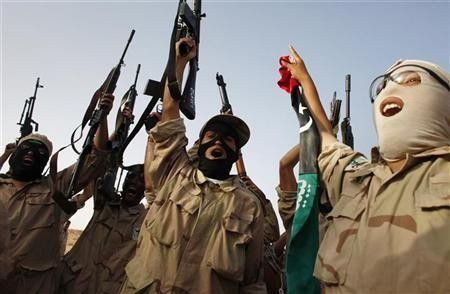Rebels in captured town plan push towards Tripoli

Libyan rebels who seized this town 80 km (50 miles) south of Tripoli said on Monday they would now push on towards Muammar Gaddafi's stronghold in the capital but expected a tough fight.
This small settlement in the desert is now the closest rebel position to Tripoli and its capture at the weekend is likely to inject some new momentum into a six-month campaign to oust Gaddafi which has been faltering over the past few weeks.
Anti-Gaddafi fighters had been camped since late June on the outskirts of Bir al-Ghanam, unable to advance. According to rebels in the town on Monday, they moved in on Saturday under cover from NATO warplanes.
They said their next target was Zawiyah, a town on the Mediterranean coast 50 km west of Tripoli.
Zawiyah was the scene of two failed uprisings against Gaddafi's rule since February. Many of the fighters in Bir al-Ghanam are from there, although a number of those who took part in the uprisings are now in prison or dead.
"Our aim is to get to Zawiyah. Once we do that Gaddafi is finished," said rebel fighter Murad Bada, who was sitting under the shade of a tree and humming a song about Zawiyah.
In the eastern third of Libya, rebel officials said they had created a security force to protect oil installations, a step which could allow them to resume regular crude exports.
The capture of Bir al-Ghanam is the biggest rebel breakthrough in weeks of largely static fighting on three fronts across Libya. But that alone is not enough to undermine Gaddafi's grip on power.
The small rebel force approaching from the south could face much stiffer resistance as it draws nearer to the capital, where Gaddafi's troops are concentrated and where he can count on a certain level of popular support.
The rebel advance elsewhere has been hampered by divisions and infighting, as well as a lack of experience in warfare.
BOMB CRATER
Libya's prime minister told reporters in Tripoli on Sunday that government forces were in control of Bir al-Ghanam after fighting off a rebel attack.
But in the town early on Monday, the only sign of government forces was the weaponry they had left behind when they fled, said a Reuters reporter in the town centre.
One artillery piece was abandoned, and three tanks were burned out. Next to one tank -- still mounted on the trailer of a tank transporter -- was a deep crater which appeared to have been caused by a NATO air strike.
Rebel fighters were resting in the heat. One was wrapping a wound on his arm which he said was caused by rocket shrapnel.
Another fighter, 32-year-old Salim Shawsh, said in the five-hour battle on Saturday to take Bir al-Ghanam, rebels attacked on foot from behind ridges on the outskirts of the town, with NATO air support.
He said five rebel fighters were killed, including a Libyan-American father and son, part of a large contingent of foreigners with Libyan roots who have come back to fight against Gaddafi.
The pair was hit by rocket fire and they died with the father clutching the son, Shawsh said.
By Monday afternoon, rebel fighters had pushed on a few kilometres north of Bir al-Ghanam, coming to a stop at a point they said was about 35 km from Zawiyah.
Fighters near the new front line said pro-Gaddafi forces were positioned in the nearby village of Nasr. The rebels said they expected a tough fight to push onwards towards Zawiyah.
OIL FORCE
Rebels stopped pumping oil to Mediterranean Sea export terminals under their control after pro-Gaddafi raiding parties attacked oil facilities in the desert.
A rebel military spokesman in the eastern city of Benghazi, the main rebel base, said a dedicated force had been created to protect the oil fields. He said it was equipped with weapons, vehicles and night-vision equipment.
That raised the prospect of oil exports resuming soon from rebel-controlled terminals, a step which would provide the rebel administration with badly-needed revenue.
The rebels and their NATO allies hope Gaddafi will eventually be forced to relinquish power if they maintain the pressure on him by starving him of weapons, fuel and cash and attacking his forces.
But if NATO's commitment to the campaign wavers, that could give Gaddafi an opportunity to hold on to power.
Some alliance members are unsettled by how long the Libyan campaign is dragging on and how much it is costing, especially at a time of economic uncertainty.
There are doubts too in some Western capitals about whether the rebel leadership is capable of holding the country together if Gaddafi is no longer in charge. Those concerns heightened last month after the rebel military chief was assassinated by people on his own side.
For now, at least, there is no sign of any let-up in the NATO bombing campaign. The alliance says the air strikes are to protect civilians from Gaddafi's forces but there is evidence of NATO coordinating its attacks with rebel offensives.
On Sunday, British Apache attack helicopters took off from a warship in the Mediterranean Sea and fired Hellfire missiles at military vehicles in Al-Watyah, the site of a government air base 170 km southwest of Tripoli, spokesman Major General Nick Pope said.
© Copyright Thomson Reuters 2024. All rights reserved.





















